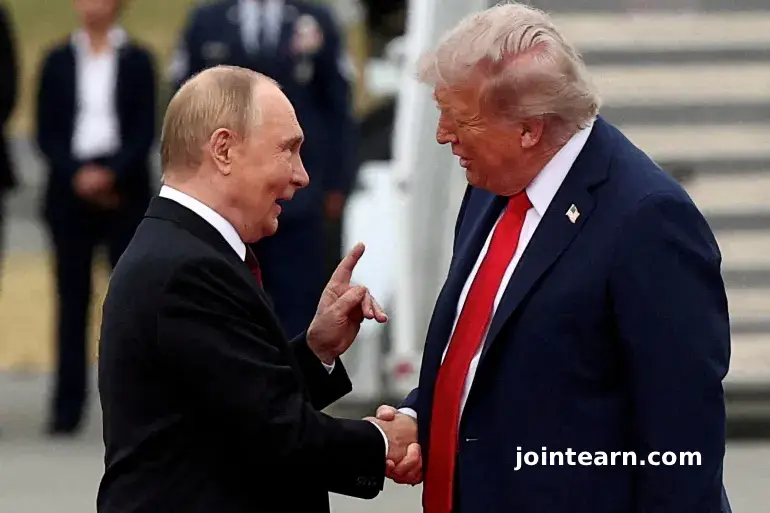
Senior officials from the United States and Russia have downplayed expectations of an imminent meeting between Presidents Donald Trump and Vladimir Putin, despite Trump’s earlier claim that a summit could take place “within two weeks” in Budapest, Hungary, to discuss a ceasefire in Ukraine.
The announcement, made on Tuesday, highlights ongoing tensions between Washington and Moscow over the terms of a potential ceasefire in the two-year-old conflict that has devastated much of eastern Ukraine.
White House, Kremlin Both Confirm No Summit Planned
“There are no plans for President Trump to meet with President Putin in the immediate future,” a senior White House official told Al Jazeera.
The Kremlin echoed that statement, with spokesperson Dmitry Peskov noting that any potential meeting would require “serious preparation.”
“No precise timeframe was initially set here,” Peskov said. “Preparation is needed, serious preparation.”
When asked about the delay during an Oval Office press briefing, Trump suggested the postponement was a matter of “efficiency.”
“I don’t want to have a wasted meeting,” he said. “I don’t want to have a waste of time, so I’ll see what happens.”
Disagreements Over Ceasefire Terms
Reports from multiple media outlets, including Reuters and CNN, suggest that the summit delay stems from deep disagreements over how to end the war.
According to unnamed officials, Moscow recently sent Washington a private communique demanding that Russia retain full control over Ukraine’s Donbas region — a condition that directly contradicts Trump’s proposal to “freeze the war at current battle lines.”
Over the weekend, Russian Foreign Minister Sergey Lavrov and U.S. Secretary of State Marco Rubio held a phone call to discuss progress toward a ceasefire. However, a planned follow-up meeting between the two was cancelled, with the White House saying their initial call had been “productive enough.”
“An additional in-person meeting between the Secretary and Foreign Minister is not necessary,” a U.S. official said.
Lavrov: Moscow’s Position ‘Has Not Changed’
Lavrov dismissed reports of Moscow’s “maximalist stance” as “unscrupulous,” but reaffirmed that Russia’s conditions remain unchanged from those agreed upon during the August Alaska summit between Trump and Putin.
“Russia has not changed its position compared to the understandings that were reached during the Alaska summit,” Lavrov said, emphasizing that the key issue now is implementation, not location or timing of the next meeting.
At that Alaska meeting, Putin stated that Russia was committed to ending the war but insisted that a lasting peace would require addressing the conflict’s “primary causes.” Those include:
- Ukraine’s neutrality and non-alignment with NATO
- The dismantling of Ukraine’s military infrastructure
- Russia’s retention of occupied territories in eastern Ukraine
Kyiv and Europe Criticize Moscow’s ‘Delaying Tactics’
Ukrainian President Volodymyr Zelenskyy, joined by eight European leaders, issued a joint statement accusing Moscow of deliberately dragging out negotiations while continuing to bombard Ukrainian cities.
“Russia’s stalling tactics have shown time and time again that Ukraine is the only party serious about peace,” the statement read. “We can all see that Putin continues to choose violence and destruction.”
The statement follows reports of renewed Russian attacks in the Dnipro and Kharkiv regions, even as diplomatic efforts continue.
Setback for Trump’s Pledge to End the War
The delay represents another political setback for Trump, who has repeatedly vowed to end the Ukraine war “within weeks” of returning to office.
His administration’s latest proposal — freezing the front lines as a foundation for negotiations — has been met with cautious optimism by Kyiv and some European capitals. However, Moscow’s demand for broader territorial control has proven a major stumbling block.
Ukraine has continued to insist that any peace process must include direct talks between Putin and Zelenskyy, but the Kremlin has ruled out such a meeting until “a peace deal is practically agreed.”
Background: The Road to Budapest
Trump first floated the idea of a Budapest summit during an October 16 phone call with Putin, describing the potential meeting as a “historic opportunity to bring peace to Europe.”
However, with Washington and Moscow still far apart on key issues, the chances of the meeting taking place in the near term now appear slim.
For now, U.S. and Russian diplomats say lower-level contacts will continue to explore possible confidence-building measures, including prisoner exchanges, humanitarian corridors, and a temporary suspension of long-range missile strikes.
But without consensus on territorial control or Ukraine’s future status, analysts warn that a meaningful ceasefire remains out of reach.


Leave a Reply